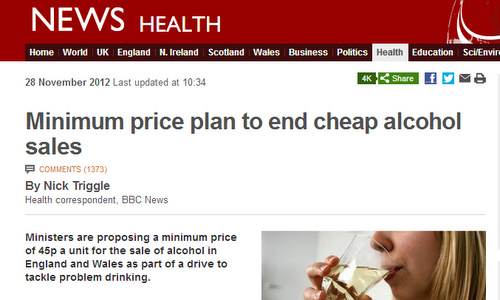The UK is considering Minimum Unit Pricing (MUP) of alcohol, with an initial level of 45 p per unit.
Initially, I couldn’t see a downside, from the perspective of a wine lover. It would make the cheapest bottle of wine £4.22 according to the BBC News story linked above. In Scotland, where a MUP of 50 p is being considered, a bottle will cost at least £4.88.
It’s not a tax, so producers and retailers will benefit from the increased price, although they may also lose some sales.
And it would (hopefully) wipe off the shelves some of the more repellent drinks whose objective seems to be to deliver as much alcohol as possible for very little money. My experience with teenagers is that they are drawn to the likes of K Cider, which is £1 a can from the corner shop and 10% alcohol.
But after discussing the topic on Twitter and Facebook, I’ve heard some good arguments why MUP might be a bad idea. There will probably be unintended consequences, and generally speaking government intervention in markets is undesirable. It may also be illegal.
It does seem, though, that raising the price of alcohol saves lives (for example, see this study in The Lancet). This is what is driving MUP, and may see it succeed.
7 Comments on Minimum Unit Pricing for alcohol: what’s the downside?



I think it’s great from the perspective of stopping multiples from offering below cost wines (witness Sainsbury’s £3.75 Yellow Tail recently; that’s £1.21 after VAT/duty have been taken out). From a health/binge-drinking perspective, if the government were serious about this, they’d look to somewhere like the States where you can’t drink until you’re 21, and it’s rigorously enforced.
The Lancet study is more of Petra Meier’s work, and is just an extension of her Sheffield University report which has been thoroughly discredited by many statistical experts. The people who will cut down their consumption are those who aren’t causing any problem, heavy drinkers and alcoholics will just pay the extra or even cut down in other areas like food, clothing etc.
I had the same initial feeling as Jamie, especially as the shelf price of all but the cheapest wines would be pretty much unaffected. But it seems to me that there are two problems with alcohol; health issues, and violence, especially in town centres each weekend. But this latter problem would not be tackled by minimum pricing – even the cheapest shot deals in pub and nightclub happy hour scenarios would be well above the minimum unit price. And making a cheap bottle of vodka £12 instead of £9 would hardly make a dent in the habits of the pre-loader drinker, trying to avoid nightclub pricing. I think that this kind of social malaise needs to be tackled by more direct policing and an intolerance of drunken behaviour. This can be acheived in the long term, I am sure. Just take a look at drink driving statistics, where such behaviour is now considered socially unacceptable. If drunken behavious was equally frowned upon, perhaps drinking behaviour would become more responsble. I know that visitors from other countries are often aghast at this aspect of our behaviour, but it’s nothing new. One only has to see Hogath’s depiction of Gin Lane to understand how long we have had this problem. As for the health issue, I think that minimum pricing is the wrong tactic, because it tries to tackle the problem at the point of sale. Better surely to impose the tax at the start of the system as at present? A few small tweaks to the excise duty bands could surely achieve this? Wine tax could easily be split into two or three narrower bands instead of the catch-all 5.5% – 15% that exists at the moment. 5.5%- 8%, 8- 12%, 12 -15%, how about that? And cider rates could be similarly tweaked?
Heavy drinkers will not always be willing to pay the price and many I meet in my work as an inner city GP already spend every penny they have on alcohol and go without food and heating etc. If the price goes up they will not be able to buy as much. Also, knowing that alcohol is quite price sensitive, it could lead to the cheaper, high sales drinks brands reducing their alcohol content so that the price can be reduced and a drop in beer strength from 5% to 4% or for spirits from 40% to 35% would make quite a difference to peoples’ health.
Clemmie might want to read the RAND report (http://alcoholireland.ie/wp-content/uploads/2010/10/rand-report.pdf) which states: “A significant number of studies have addressed the relationship between the price of
alcohol and its consumption: in a recent meta-analysis of alcohol demand, researchers synthesised the results from 112 English-language studies that met their inclusion criteria, and found ‘statistically overwhelming evidence of effects of alcohol pricing on drinking’
(Wagenaar et al. 2008).” – where’s the “thorough discrediting” here? Isn’t the Adam Smith a well-known right-wing think tank? Why assume that it’s demoonisation of one researcher’s work is the universal truth?
I wouldn’t trust the Lancet as far as I could throw it (too politically motivated), and the science in the paper Dermot refers to seems thin to say the least (but, hey, there’s a massive market for this kind of thing, and one can’t blame people for trying to supply whatever they can). I suppose, though, for purely selfish reasons, I don’t have a problem with minimum pricing policy per se, it’s the justification that annoys me.
For what it’s worth, I asked an epidemiologist (and wine-writer) to take a look at the RAND report and he was far from complimentary about it, although I think he found it so annoying that he didn’t read it all. You can see his comments here: http://www.wine-pages.com/ubb/ultimatebb.php?ubb=get_topic;f=1;t=036378;p=1#000019